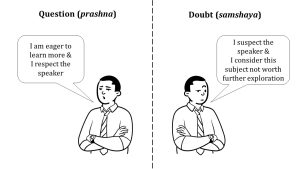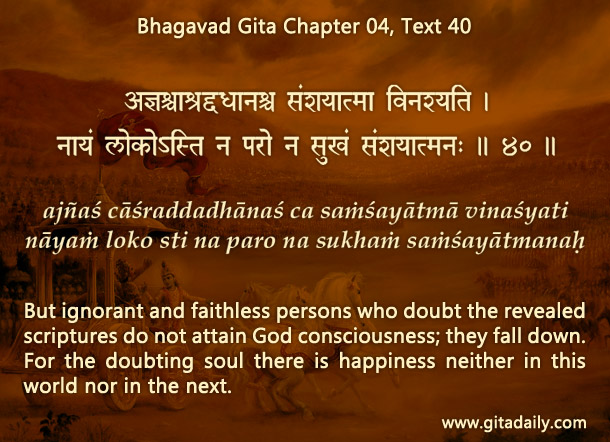 After hearing a spiritual talk, interested members of the audience sometimes respond by saying: “I have a doubt.” However, what they usually have is a question (prashna), not a doubt (samshaya).
After hearing a spiritual talk, interested members of the audience sometimes respond by saying: “I have a doubt.” However, what they usually have is a question (prashna), not a doubt (samshaya).
While both question and doubt convey a present lack of clear understanding, they differ drastically in their approach to dealing with that incomprehension. When someone has a question, implicit is an eagerness to learn – coupled with respect for the speaker. In contrast, when someone has a doubt, implicit is a suspicion of the speaker – coupled with a judgment that the subject doesn’t merit any further time, thought or study.
Given that doubts have this negative connotation, the Bhagavad-gita frequently urges us to have no doubt (08.07). Further, Gita commentators sometimes equate doubts with dangerous demons that need to be slain, often by divine empowerment. In general, the Gita positions doubt as the opposite of faith (03.31-32; 04.39-40). In fact, the latter verse (04.40) states that faith is the launching pad for knowledge.
Intriguingly, when used in this sense, the term ‘faith’ doesn’t correlate much with believing, which is frequently used with a negative connotation; it correlates much more with seeking, which is usually used with a positive connotation. Such seeking is like a questioning attitude or inquisitiveness, which is appreciated not just in the Gita (10.19), but also in Srimad-Bhagavatam (02.01.01) and Vedanta-Sutra (1.1.1).
Of course, real-life usage of these terms isn’t always so cut and dry. Sometimes, doubt can be used in a positive sense, especially when it drives us to examine our present conceptions and explore alternative, better understandings. Used in this sense, doubt is considered to be the first step in the process of gaining knowledge (Bhagavatam 03.26.30).
The more we use terms carefully, the more we promote an underlying attitude that helps, not hinders, our journey toward deeper understanding.
One-sentence summary:
Whereas doubts frequently impede our quest for knowledge, questions aid that quest.
Think it over:
- When we have questions, what is the implication?
- When we have doubts, what is the implication?
- When can both faith and doubt have a positive connotation?
***
04.40: But ignorant and faithless persons who doubt the revealed scriptures do not attain God consciousness; they fall down. For the doubting soul there is happiness neither in this world nor in the next.
To know more about this verse, please click on the image


Leave A Comment